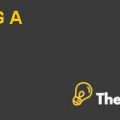
Demonstrate a thorough understanding of the case by describing in great detail all aspects of the case
Case Introduction & Problem Statement
Royal bank of Canada is scrutinizing the old and current policies of Thailand Government with regard to the negative and positive opportunities available for foreign investment as a financial institution. In 1980 due to high uncertainty in Thailand, the Royal Bank of Canada closed its office but now RBC has entered again and it is analyzing the situation from all aspects to start its operations in Thailand again. Royal Bank of Canada has to decide that whether decisions of the Thailand Government and IMF suit them or not and they need to analyze the future viewpoint to stay there or to move somewhere else.
Canadian Banking System and Royal Bank of Canada
The banking system of Canada is among the most unwavering and established banking system in the world. This can be said by keeping considering the fact that from the year1923, Canada had faced only two bank breakdowns in comparison with the 17,000 bank breakdowns in the United States from the year 1921 and in both the cases there was no loss faced by the bond holders and deposit holders.
Royal Bank of Canada was established in the year 1869. It was Canada’s major financial body and the North America’s sixth biggest bank that had the assets of around 245 billion Canadian dollars in September 1997. In the year 1996, the Royal Bank of Canada’s earning created a record number of 1.2 billion Canadian dollars and return of equity was 19.1% as per the statistics of the year 1997 (first quarter). Royal Bank of Canada was constantly touching new heights and reached the market capitalization of around 20.4 billion Canadian dollars. The bank consists of more than 1600 branches and over 4000 computerized banking machines to satisfy needs and wants of 10 million customers.
Royal Bank of Canada in Thailand
In the year 1980, Royal Bank of Canada opened an office in Bangkok with limited operations but its core desire of obtaining a full branch license could not be fulfilled due to the extremely slow growth of the financial sector. In the year 1986, Royal Bank of Canada decided to close its operation in Bangkok.
Royal Bank of Canada entered back in Thailand on June 16, 1997. RBC opened a new office at wireless road offering both the corporate and correspondent banking services. On July 2, 1997 there was a sudden collapse in property and financial sector of Thailand that led to certain immediate steps that were taken by the government, which resulted in the suspension of the major financial companies of the country including some major banks. After a month the International Monetary Fund intervened and passed a bailout package of $16.7 billion for Thailand to overcome those sudden financial crises. The report of American express survey has raised serious uncertainties in minds of investors, the report say that Thailand had the maximum consumer distrust in Asia and the surrounding economies like Malaysia and Indonesia have been negatively impacted by insecurity.
Mr. Mark, the country manager of Royal Bank of Canada in Thailand had only hired one staff member initially. Since he was an experienced person so he realized that while investing in an emerging market like Asia; patience and persistence were the key elements. Royal Bank of Canada identified some profitable opportunities in the telecom, mining & trade financing and in the energy sector. Royal Bank of Canada finally decided to work hard and grab the maximum opportunity from the expected growth of the Thailand financial sector. They planned to hire a team of 5 members headed by the general manager, who would be an experienced banker from the existing network of Royal Bank of Canada. Furthermore, the Royal Bank of Canada has also been discussed in the perspective of Asian markets. The bank has employed a staff of 400 people based in Japan, Singapore, Hong Kong, China, Korea, Taiwan and most recently in Thailand. Recently, the Royal Bank of Canada has provided US $100 million facilities to more than 15 Thai companies present in Thailand and in overseas. The application of Royal Bank of Canada for acquiring the Bangkok international banking facility license was approved in the year 1996.
Thailand Situation
Thailand’s overall situation was quite disturbing from economical, social and political perspectives. The politicians were corrupted, less competent and they were found to be solely responsible for the overall crises. Sometimes, there were rumors of the expected military coups and recently the finance minister has resigned from the post, which is approximately equal to digging a hole for currency and the stock market of the country. Many industries were monopolized in Thailand, which included tobacco, telecommunication, rail & air ways and motor transportation..............................
This is just a sample partial case solution. Please place the order on the website to order your own originally done case solution.
After a 15-year absence, the Royal Bank of Canada returned to Thailand in 1997. In a period of high economic uncertainty, the bank must weigh the merits of Thailand compared to other markets in the Asia-Pacific region. This case provides detailed information on the auxiliary start-up costs (including staff, capital costs) and requires solutions for the organization / human resource issues, as well as the best strategic approach to the market. "Hide
by Paul Beamish, Bernice Scholten, Lesley Stephenson Source: Richard Ivey School of Business Foundation 26 pages. Publication Date: June 23, 1999. Prod. # 98M032-PDF-ENG












